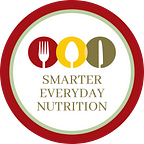Feeding Your Brain: The Connection Between Nutrition and Cognitive Health!
We’ve all heard the old adage, “you are what you eat,” but did you know this saying applies to your brain too? Emerging research has uncovered tantalizing clues about the role our diet plays in cognitive health and warding off cognitive decline. So, grab a bowl of blueberries (spoiler alert!) and settle in as we explore the latest insights on brain food.
For decades, we’ve known about the links between diet and heart health, but brain health has been a somewhat murkier subject. With recent advances in medical and nutrition research, we’re starting to see how crucial what we eat is to our thinking caps.
The Fats of the Matter
New research has brought omega-3 fatty acids into the limelight[1]. These are the type of fats often found in fish, walnuts, and flax seeds. Studies have shown that a regular intake of these nutrients can slow the decline of cognitive function and even ward off Alzheimer’s disease[3]. How, you might ask? Omega-3 fatty acids are crucial for brain function, helping to improve cell membrane health, thereby aiding nerve cells to communicate more effectively with each other.
The Power of Antioxidants
Berries, dark chocolate, nuts — not only are they delicious, but they’re also loaded with antioxidants! These nutrients fight against oxidative stress and inflammation, two conditions that can contribute to cognitive decline. Recent studies suggest that a diet high in antioxidants can boost brain health and slow cognitive aging. Berries, particularly blueberries and strawberries, have been linked with slower rates of cognitive decline[2]. This means indulging in a berry smoothie could have far-reaching implications for your brain’s future
Vitamins for Victory
Certain vitamins have been making headlines in the world of cognitive health. In particular, vitamins B, D, and E have been linked to good brain health. They contribute to energy production, DNA repair, and the neutralization of free radicals, respectively[4][5][6]. A deficiency in any of these vitamins can lead to cognitive impairment. So it might be time to reevaluate your relationship with your multivitamins or find some delicious, nutrient-dense foods to add to your diet!
Not Just What, But When
But it’s not just about what we eat — it’s also about when we eat. Research into intermittent fasting has suggested that this practice could help protect against cognitive decline[7]. It works by boosting the body’s cellular stress response, which could potentially aid in fighting off neurodegenerative diseases. Before diving into this, do consult your healthcare provider as it may not be suitable for everyone.
Plant Power
Finally, we can’t ignore the growing body of research touting the benefits of a plant-based diet for cognitive health. The Mediterranean and DASH (Dietary Approaches to Stop Hypertension) diets, both rich in fruits, vegetables, whole grains, and lean proteins, have been associated with a lower risk of cognitive decline[8]. They are heart-healthy and brain-healthy too!
So, the takeaway message here?
Nutrition is an essential part of brain health. While the brain might be a complex organ, keeping it fit and healthy could be as simple as reaching for the right snack. By incorporating nutrient-rich foods into our diet, we can fortify our mental agility and potentially ward off cognitive decline.
Remember, a nourished brain is a happy brain!
Don’t forget to clap and follow us to get a little Smarter Everyday with Nutrition!
References:
1. Swanson, D., Block, R., & Mousa, S. A. (2012). Omega-3 fatty acids EPA and DHA: health benefits throughout life. Advances in Nutrition, 3(1), 1–7.
2. Devore, E. E., Kang, J. H., Breteler, M. M., & Grodstein, F. (2012). Dietary intakes of berries and flavonoids in relation to cognitive decline. Annals of neurology, 72(1), 135–143.
3. Morris, M. C., Evans, D. A., Tangney, C. C., Bienias, J. L., & Wilson, R. S. (2005). Fish consumption and cognitive decline with age in a large community study. Archives of neurology, 62(12), 1849–1853. Link
4. Kennedy, D. O. (2016). B vitamins and the brain: Mechanisms, dose and efficacy — A review. Nutrients, 8(2), 68.
5. Annweiler, C., Schott, A. M., Allali, G., Bridenbaugh, S. A., Kressig, R. W., Allain, P., … & Beauchet, O. (2010). Association of vitamin D deficiency with cognitive impairment in older women: cross-sectional study. Neurology, 74(1), 27–32.
6. Morris, M. S., Selhub, J., & Jacques, P. F. (2012). Vitamin B-12 and folate status in relation to decline in scores on the mini-mental state examination in the Framingham heart study. Journal of the American Geriatrics Society, 60(8), 1457–1464.
7. Mattson, M. P., Longo, V. D., & Harvie, M. (2017). Impact of intermittent fasting on health and disease processes. Ageing research reviews, 39, 46–58.
8. Singh, B., Parsaik, A. K., Mielke, M. M., Erwin, P. J., Knopman, D. S., Petersen, R. C., & Roberts, R. O. (2014). Association of Mediterranean diet with mild cognitive impairment and Alzheimer’s disease: a systematic review and meta-analysis. Journal of Alzheimer’s Disease, 39(2), 271–282.
Tangney, C. C., Li, H., Wang, Y., Barnes, L., Schneider, J. A., Bennett, D. A., & Morris, M. C.
